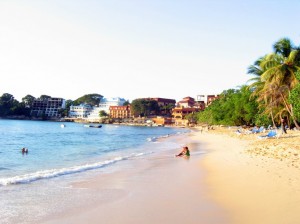 It is no surprise that the Caribbean has the largest tourism economy in the world. Countries depend heavily on this industry to support their economies and the region’s ‘sun, sand and sea’ leaves it with no shortage of visitors (I, for one, do not mind vacationing there every chance I get). With all that tourism makes available to foreign travelers, it is important to consider what the advantages are for the islands and its people in return. If tourism is to remain successful, it has to thrive in a manner that strengthens local economies and encourages community development.
It is no surprise that the Caribbean has the largest tourism economy in the world. Countries depend heavily on this industry to support their economies and the region’s ‘sun, sand and sea’ leaves it with no shortage of visitors (I, for one, do not mind vacationing there every chance I get). With all that tourism makes available to foreign travelers, it is important to consider what the advantages are for the islands and its people in return. If tourism is to remain successful, it has to thrive in a manner that strengthens local economies and encourages community development.
The tourism economy contributes almost $50 billion to the region’s Gross Domestic Product (GDP) every year, though it is uncertain how much of that revenue actually reaches local populations. Foreign companies tend to own a significant portion of tourism infrastructure such as hotels, transportation, and telecommunications resources. Additionally, the tourism industry is strongly reliant on imports. With accommodations comprising the greatest share of the sector’s expenditures, the majority of tourist dollars do not stay on the islands.
The cruise ship industry is another example of this outflow. Six of the eight leading Caribbean cruise lines own private islands and ports, and employ less than seven percent of the population (keep in mind that cruises bring the highest number of visitors to the region). Needless to say, this generates very little economic activity for the islands themselves.
Tourism has the potential to enrich local economies without compromising commercial interests. Imagine if hotels entered into neighborhood partnerships with nearby restaurants, since food and beverages are the industry’s second-highest expenditures, for instance. Tourists who opt for the all-inclusive option could then chose to dine at these locally-owned eateries and get a better feel for the distinctive culture and place, moreover allowing those businesses to receive a percentage of the hotel’s charges. Other travelers could receive discounted rates at these establishments by being a guest of an area hotel. Creating enterprise zones for surrounding communities would be another way to cultivate business activity and to encourage tourist spending in the local economy.
The industry could also improve neighborhoods by working with local authorities to extend access to potable water, electricity and other resources that are readily available to tourists but not to residents. Using tourism revenue to supply basic infrastructure would have a lasting impression on the built environment while easing the strenuous relationship that local people often have with tourism. Trinidad and Tobago, for example, has a Tourism Action Committee that promotes communal interests and lobbies on their behalf to national entities. Creating similar mechanisms for community members to voice their concerns throughout the Caribbean would be useful in advancing the industry.
Every island has a distinctively rich and vibrant cultural history. This is what draws people to the region to some extent. However, the rapid growth of the tourism sector, without sufficient attention to community development, risks diminishing the very facets that make the Caribbean enticing. Finding viable opportunities to incorporate community development into the tourism industry is a surefire way to enhance local economies and to give back to the islands so many love to enjoy.
As originally featured in the Urban Times.


About The Author: Vanessa L.
More posts by Vanessa L.